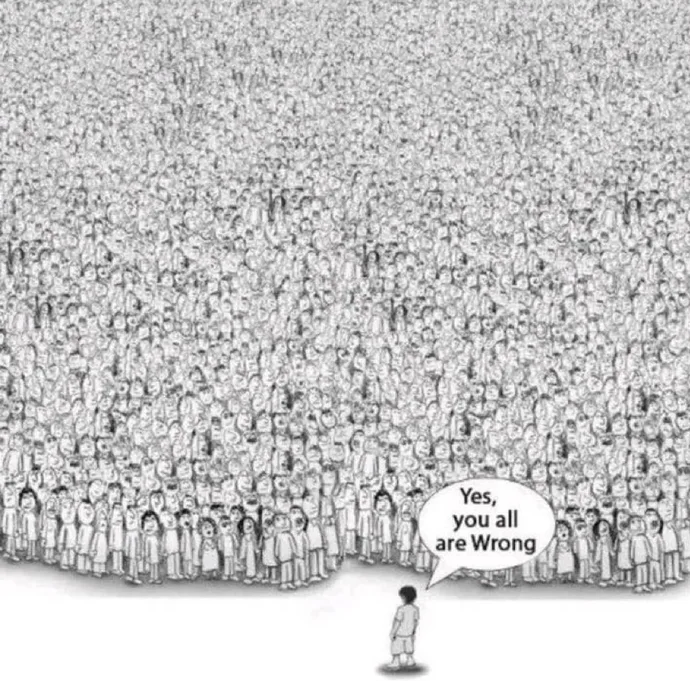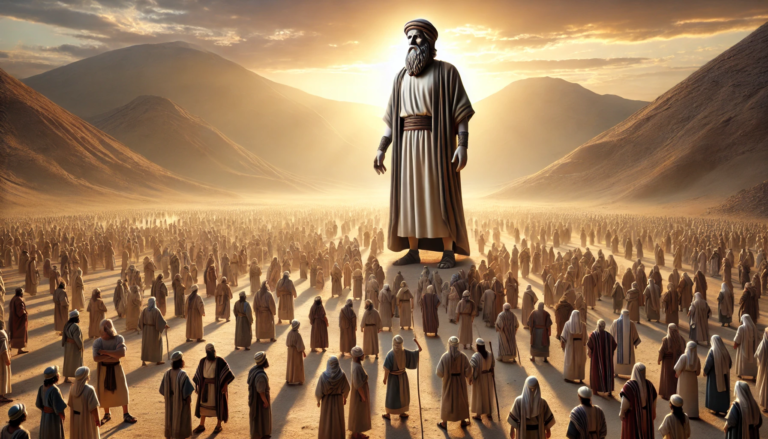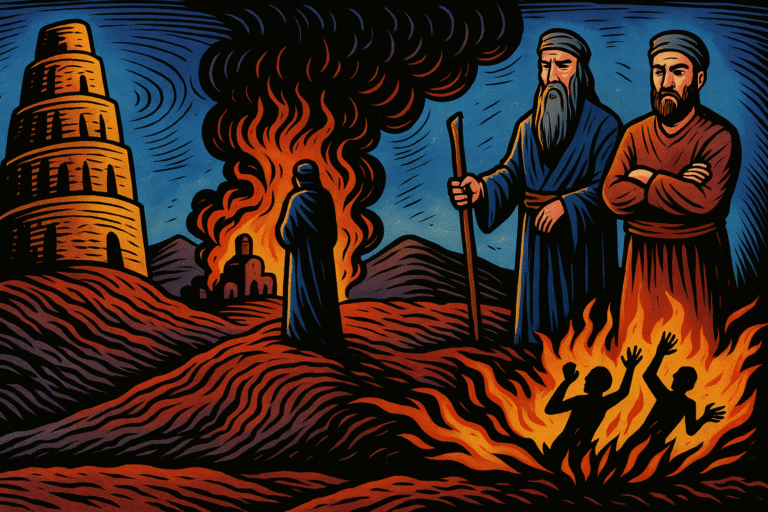Beware the Majority Reports

It has become a popular saying, often attributed to Mark Twain (although there is no known source that he ever said it) that, 'If you don't read the newspaper, you're uninformed, but if you read the newspaper, you're misinformed.' If true, we would seem to be caught between a rock and a hard place, in a no win situation. Which is worse, to be uninformed or to be misinformed? To remain uninformed would be to lend credence to ignorance, yet purposefully choosing to be misinformed would be tantamount to rejecting truth and accepting the ridiculous notion that lies and falsehoods may be embraced without negative consequence. So what are we supposed to do?
It is written in the Torah (Shemot 23:2): לֹא־תִהְיֶה אַחֲרֵי־רַבִּים לְרָעֹת וְלֹא־תַעֲנֶה עַל־רִב לִנְטֹת אַחֲרֵי רַבִּים לְהַטֹּת (You shall not go after the majority to do bad, and you shall not respond in a lawsuit to follow the many to pervert justice). The Ibn Ezra writes on this verse: וחז"ל פירשו כי מזה נלמוד כי הלכה כרבים ומה שהעתיקו הוא האמת ואחר שהכתוב אמר לא תהיה אחרי רבים לרעות. מזה נלמוד כי אם יהיו הרבים לטובה שהיא מצוה ללכת אחריהם (And Chazal explained that from this we learn that halachah is decided according to the majority. And that which they transmitted is the truth, for since the verse says, 'you shall not go after the majority to do bad', from this we learn that if the opinion of the majority is to do good, that it is a mitzvah to go after them). So although the verse doesn't directly say that we are supposed to decide the halachah based on the majority, Chazal derived it from the wording in the verse. This principle is stated categorically in the Gemara (Berachot 9a): וְיָחִיד וְרַבִּים הֲלָכָה כְּרַבִּים (An individual versus the many, the halachah is according to the many). Therefore, all things being equal, which includes the proviso that all deciding parties are sincerely striving to do good, to disseminate the truth with no ulterior motives, and to decide the halachah in accordance with the will of G-d, we make halachic decisions according to the majority opinion of our Sages. When even one of these conditions are not met, no mandate exists to follow the majority. In such cases, what are we supposed to do? We must either choose to stay uninformed and accept ignorance or strive to clarify all forms of potential misinformation.
Consider the following examples which shed light on this topic.
Korach, together with Datan and Aviram the sons of Eliav, and On ben Pelet, gathered 250 princes of the congregation of Yisrael, the most important people of the generation, gedolei ha-dor, and rose up against Moshe and Aaron (Bemidbar 16:1-2). That's quite the majority. It is said that Moshe Rabbeinu didn't even have a minyan to pray in! But they were all wrong, and as we know, it didn't end up so well for them. They all died (16:32-35) except for On ben Pelet, who removed himself from the opinion of the majority because he listened to and acted upon the wisdom of his wife.
Another example is the sin of the golden calf (Shemot 32). Except for the Tribe of Levi (32:26), every other tribe joined the debauchery along with its avodah zarah. What was the result? Approximately 3000 people died that very day (32:28).
How about the twelve spies who traversed the Land of Canaan for forty days (Bemidbar 13-14)? Ten of them gave an evil report whereas only two, Yehoshua and Calev, spoke the truth with emunah. We know what happened. The entire generation followed after the majority in accepting their evil report, showed no emunah in Hashem, and wept all night long in their tents. In the end, the people spent forty years wandering around the desert, dying one after the other until none of them lived long enough to enter the Promised Land (except for Yehoshua and Calev). Not only that, but we are suffering from the effects of this sin to this very day.
We also have the incident of David's son Avshalom who gathered to himself a sizable military force and went out to win over the hearts of the citizenry (Shemuel Bet 15). Once he had acquired a substantial following, he initiated a treasonous uprising against his father and had himself declared king forcing David and a handful of his loyal followers into exile.
For each of these cases, we could ask ourselves a simple question. If I had been alive back then, whom would I have followed? It's not so simple, is it? Although Hindsight may have 20/20 vision, Foresight is quite myopic.
What about the ten tribes? Under the leadership of Yarovam ben Nevat, the majority of the nation openly rebelled and declared their independence from the Davidic monarchy (Melachim Aleph 12). Today, it sounds ludicrous. How could such a thing even get off the ground? Well, it didn't just get off the ground, it was a 'highly successful' political and religious movement that lasted for over two centuries!
Many years later, we read the story of Eliyahu ha-Navi going up against 450 prophets of Baal and 400 prophets of the Asherah (Melachim Aleph 18). That's a super-majority of 850 to 1. He then summoned the entire nation to come to Mt. Carmel. The words he spoke are as relevant today as they were then (18:21): עַד־מָתַי אַתֶּם פֹּסְחִים עַל־שְׁתֵּי הַסְּעִפִּים אִם־יְיָ הָאֱלֹקִים לְכוּ אַחֲרָיו וְאִם־הַבַּעַל לְכוּ אַחֲרָיו (How long will you jump back and forth on two opinions? If Hashem is the G-d, go after Him, but if it is the Baal, go after him). And what was their answer? The verse continues: וְלֹא־עָנוּ הָעָם אֹתוֹ דָּבָר (And the people didn't answered him [so much as] a word). Why not? Rashi put it like this: שֶׁלֹּא הָיוּ יוֹדְעִין לְהַבְחִין (They didn't know how to distinguish [between Hashem and Baal]). That's quite an indictment. They had lost so much of their brains that they couldn't even distinguish between Hashem and Baal. They had absolutely no clue. To put this into our context, Eliyahu was telling them, 'Clarify the sources of misinformation and get off the fence. Figure it out!' Therefore, we learn that it is insufficient and inappropriate for a son or daughter of Yisrael, a prince or a princess of the King. to say, 'I don't know. It's too confusing. And anyway, I'm not an expert in these things. What do you expect me to do? Everybody else is worshiping and serving Baal. I'll just follow the majority. There's no way they could all be wrong.'
The reader can come up with others examples if he is so inclined. Our history is filled with stories demonstrating the dangers in following after the majority when that majority is not pursuing the truth. And as we have seen, it's not just a theoretical issue. It's often a matter of life and death! It was then and it still is today. People can suffer and die when majority opinions are believed without scrutiny.
We are not downplaying the intensity of pressure felt by an individual when faced with a majority opinion that goes contrary to his personal understanding, belief or inclination. The fact that it can be so intense explains, in part, why the majority often continues to win an even greater majority making it even more difficult to withstand it, the whole process becoming a vicious cycle. But we need to be encouraged and reminded from time to time that truth is not a popularity contest. We cannot justify relinquishing our personal responsibility by saying אֵלּוּ וָאֵלּוּ דִּבְרֵי אֱלֹקִים חַיִּים הֵן (These and these are the words of the living G-d). In all of these types of cases, 'these and these' are clearly not the words of the living G-d, and in these cases, the truth (or the closest approximation to it) is not determined by majority rule. Hence, we need to strengthen ourselves because it requires a tremendous amount of inner strength and courage to hold one's ground and withstand the pressure of the mob.
So how is it that we become so concerned, dare we say, obsessed, with the opinion of the majority in almost every sphere of society today? We allowed ourselves to become infected with the so-called light of democracy. Its ideology has come to govern not only our body politic but the very act of thinking itself. But anyone with even a little bit of historical awareness knows that a democracy is a dangerous political system that offers little to no protection to those in the minority. For example, a democracy has often been compared to two wolves and a lamb voting on what to eat for lunch. Plato said, 'Dictatorship naturally arises out of democracy.' John Adams, the second President of the United States, said, 'Remember, democracy never lasts long. It soon wastes, exhausts, and murders itself. There never was a democracy yet that did not commit suicide.' The fact of the matter is that every democracy self-destructs through the tyranny of the majority. That being the case, perhaps we should take a moment to pause and consider a better way.
The prophet testified about Avraham Avinu (Yechezkel 33:24): אֶחָד הָיָה אַבְרָהָם וַיִּירַשׁ אֶת־הָאָרֶץ (Avraham was echad [one] yet he was given possession of the land [of Yisrael]). And even though he was only one, he stood up against the entirety of the rest of the world. He wasn't interested in majority rule. Rather, he was motivated to discover the truth, no matter the cost. Let's read how the Rambam puts it (Mishneh Torah, Hilchot Avodah Zarah 1:3): כֵּיוָן שֶׁנִּגְמַל אֵיתָן זֶה הִתְחִיל לְשׁוֹטֵט בְּדַעְתּוֹ…וְלֹא הָיָה לוֹ מְלַמֵּד וְלֹא מוֹדִיעַ דָּבָר אֶלָּא מֻשְׁקָע בְּאוּר כַּשְׂדִּים בֵּין עוֹבְדֵי כּוֹכָבִים הַטִּפְּשִׁים וְאָבִיו וְאִמּוֹ וְכָל הָעָם עוֹבְדֵי כּוֹכָבִים וְהוּא עוֹבֵד עִמָּהֶם…וּמֵבִין עַד שֶׁהִשִּׂיג דֶּרֶךְ הָאֱמֶת…וְיָדַע שֶׁכָּל הָעוֹלָם טוֹעִים…וְכֵיוָן שֶׁהָיוּ הָעָם מִתְקַבְּצִין אֵלָיו וְשׁוֹאֲלִין לוֹ עַל דְּבָרָיו הָיָה מוֹדִיעַ לְכָל אֶחָד וְאֶחָד כְּפִי דַּעְתּוֹ עַד שֶׁיַּחְזִירֵהוּ לְדֶרֶךְ הָאֱמֶת עַד שֶׁנִּתְקַבְּצוּ אֵלָיו אֲלָפִים וּרְבָבוֹת וְהֵם אַנְשֵׁי בֵּית אַבְרָהָם (When this mighty man was weaned, he began to explore with his da'at…He didn't have a teacher nor anyone to inform him, rather he was sunk in Ur Kasdim among the idol worshipers and his father and his mother and all the people were idol worshipers and he served [idols] with them…and he came to understand until he comprehended the way of truth…And he knew the whole world was wrong…And when the people were gathered around him and they asked him of his words, he made known to each one according to his intelligence, until he turned them back to the way of truth, until thousands and tens of thousands were gathered to him—they are the people of the House of Avraham).
As R' Nachman explains in the Hashmata, a short teaching between parts 1 and 2 of Likutei Moharan: שחשב בדעתו שהוא רק יחידי בעולם ולא הסתכל כלל על בני העולם (He thought in his da'at that he was alone in the world, and he didn't regard the people in the world at all). Of course, having perfected the attribute of chesed, he loved everyone with a deep and abiding love, but he didn't consider their beliefs or opinions a relevant factor in his quest for truth. This is stated later on in the Hashmata when R' Nachman explains how we are to live according to Avraham's sterling example: וכן כל הרוצה לכנוס בעבודת ה' אי אפשר לו לכנוס כי אם על-ידי בחינה זו, שיחשוב שאין בעולם כי אם הוא לבדו יחידי בעולם ולא יסתכל על שום אדם המונעו…רק יהיה בבחינת אחד היה אברהם כאלו הוא יחיד בעולם (And so, all who want to enter into the service of Hashem, it is impossible for him to enter except in this aspect, that he should think that there isn't anyone in the world except for himself, and he shouldn't regard anyone who tries to impede him…only that he should be in the aspect of 'Avraham was echad,' like he is the only one in the world).
Avraham's great legacy, which he labored his whole life to teach to everyone he met, is to search constantly and ask the difficult questions. He did not pretend to believe in what he knew was wrong. Truth was of primary importance, and when he discovered it he could not be moved or shaken from his convictions. As the Rambam wrote, 'He knew the whole world was wrong'. Don't think even for a moment that was arrogance. It wasn't; it was just the plain truth. He couldn't live a lie or play a game for the sake of convenience. He chose personal sovereignty to the slavish tyranny of the mob, and he chose to accompany truth wherever it led him—even into Nimrod's fiery furnace. And this is why he became the patriarch of all patriarchs. This is the real meaning of אֶחָד הָיָה אַבְרָהָם (Avraham was echad). And this is what he bequeathed to his son, Yitzchak, and he to his son, Yaakov, and so on. It is also our legacy and what we must bequeath to our children. Therefore, we need to ask ourselves, Have I fallen short of Avraham's legacy? Have I relinquished my personal responsibility, the responsibility of a sovereign individual under G-d, to discover the truth, even when that truth may be an uncomfortable one? Have I accepted majority opinions because of convenience?
We cannot bequeath what we do not possess.







Excellent!!
Brilliant!